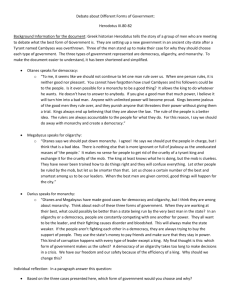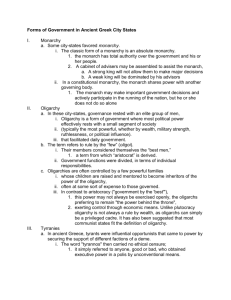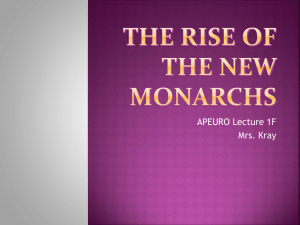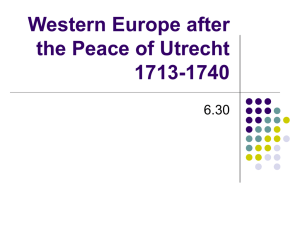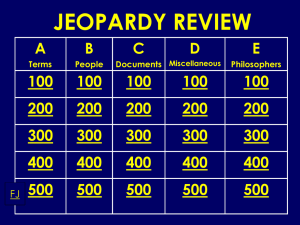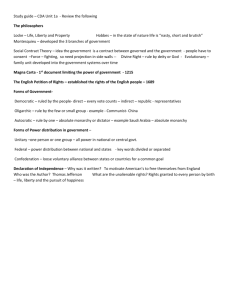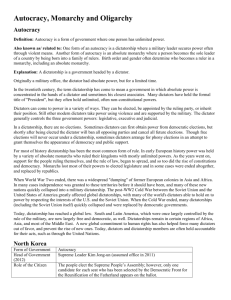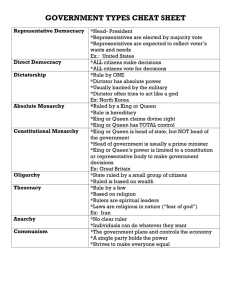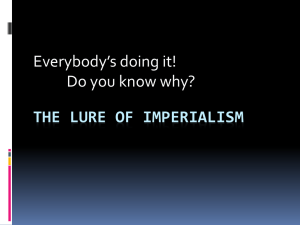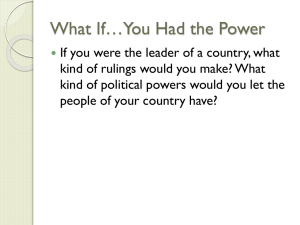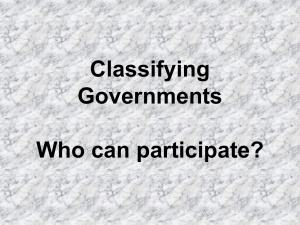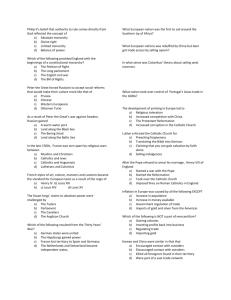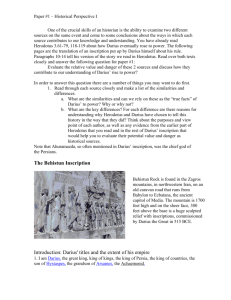Reading 11
advertisement
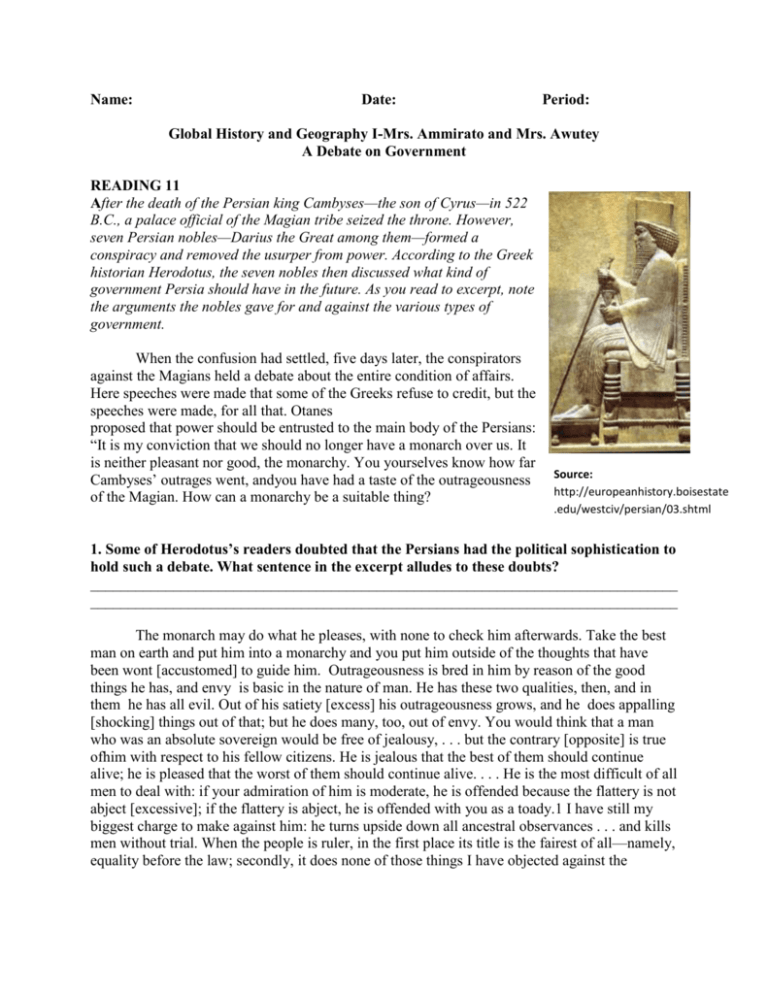
Name: Date: Period: Global History and Geography I-Mrs. Ammirato and Mrs. Awutey A Debate on Government READING 11 After the death of the Persian king Cambyses—the son of Cyrus—in 522 B.C., a palace official of the Magian tribe seized the throne. However, seven Persian nobles—Darius the Great among them—formed a conspiracy and removed the usurper from power. According to the Greek historian Herodotus, the seven nobles then discussed what kind of government Persia should have in the future. As you read to excerpt, note the arguments the nobles gave for and against the various types of government. When the confusion had settled, five days later, the conspirators against the Magians held a debate about the entire condition of affairs. Here speeches were made that some of the Greeks refuse to credit, but the speeches were made, for all that. Otanes proposed that power should be entrusted to the main body of the Persians: “It is my conviction that we should no longer have a monarch over us. It is neither pleasant nor good, the monarchy. You yourselves know how far Cambyses’ outrages went, andyou have had a taste of the outrageousness of the Magian. How can a monarchy be a suitable thing? Source: http://europeanhistory.boisestate .edu/westciv/persian/03.shtml 1. Some of Herodotus’s readers doubted that the Persians had the political sophistication to hold such a debate. What sentence in the excerpt alludes to these doubts? ______________________________________________________________________________ ______________________________________________________________________________ The monarch may do what he pleases, with none to check him afterwards. Take the best man on earth and put him into a monarchy and you put him outside of the thoughts that have been wont [accustomed] to guide him. Outrageousness is bred in him by reason of the good things he has, and envy is basic in the nature of man. He has these two qualities, then, and in them he has all evil. Out of his satiety [excess] his outrageousness grows, and he does appalling [shocking] things out of that; but he does many, too, out of envy. You would think that a man who was an absolute sovereign would be free of jealousy, . . . but the contrary [opposite] is true ofhim with respect to his fellow citizens. He is jealous that the best of them should continue alive; he is pleased that the worst of them should continue alive. . . . He is the most difficult of all men to deal with: if your admiration of him is moderate, he is offended because the flattery is not abject [excessive]; if the flattery is abject, he is offended with you as a toady.1 I have still my biggest charge to make against him: he turns upside down all ancestral observances . . . and kills men without trial. When the people is ruler, in the first place its title is the fairest of all—namely, equality before the law; secondly, it does none of those things I have objected against the monarch. . . . I vote therefore that we abolish the monarchy and increase the power of the people; for in the Many lies All.” . . . Megabyzus would have them turn things over to an oligarchy [rule by small group of nobles], and his speech was as follows: ”What Otanes has said about the abolition of the monarchy you may regard as being my opinion also. But when he proposes to turn over power to the Many, he has fallen short of the nicest2 judgment. There is nothing stupider, nothing more given to outrage, than a useless mob. . . . The despot, if he does something, does it of knowledge; but knowledge is what does not inhere [exist] in the Many. How can men know anything when they have never been taught what is fine, nor have they any innate [inborn] sense of it? . . . Let those who have ill will to the Persians press for a democracy; but let us choose a society of the Best Men and entrust the power to them. Among this number we shall be ourselves, and we may reasonably assume that, when the men are the Best, their counsels will be so too.” 2. Why does Megabyzus believe that an oligarchy is the best form of government? ______________________________________________________________________________ ______________________________________________________________________________ . . . Darius gave his judgment as third among them: “What Megabyzus has said about the Many seems to me truly said; not so his comments on oligarchy. Suppose, for the argument, that all three constitutions are of the very best—the best democracy, the best oligarchy, the best monarchy. I declare to you that, of these three at their best, monarchy is far superior. Nothing is manifestly [obviously] better than the one best man. He will have judgment to match his excellence and will govern the Many blamelessly, and what measures he must devise against illdoers will be wrapped in a similar well-judging silence. In an oligarchy, many try to practice virtue for the public good, but in doing so they engender [develop] bitter private enmities [hatreds]. Each of the oligarchs wants to be chief man and to win with his opinions, and so they come to great hatreds of one another, and from this comes faction, and from faction comes murder. From murder there is a relapse into despotism. . . . I give my vote that, as we were freed by one man [Cyrus], so we should keep this freedom through one man; apart from this, we should not abolish any of our ancestral laws that are sound [reliable]. It would be better so.” These were the three opinions that were put forward. Four of the Seven gave their support to the last—that of Darius. 3. Why does Darius prefer a monarchy to an oligarchy? ______________________________________________________________________________ ______________________________________________________________________________ Definitions: 1person seeking advancement through flattery 2most accurate From The History: Herodotus, translated by David Grene. Copyright © 1987 by The University of Chicago.
